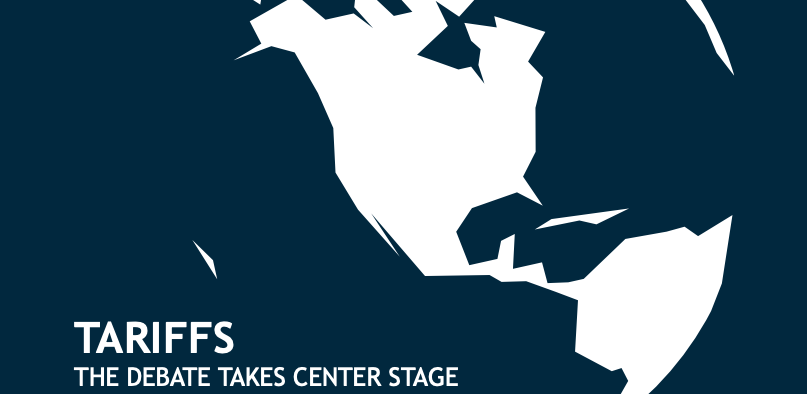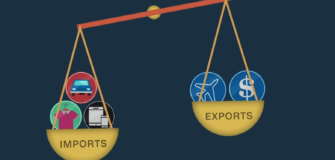Tariffs: The Debate takes center stage for Midwest manufacturers
Share

Up until six months ago, Illinois manufacturers were enjoying a newfound enthusiasm about their industry. For eight straight months, monthly surveys conducted by the Technology & Manufacturing Association showed
their members expected the next 12 months to be good for their businesses. Monthly surveys ranged from 84 percent optimistic in August 2017 to a high of 92 percent in March 2018.
Then something happened in March 2018 that caused the number of once-optimistic TMA members to decline sharply by 20 percent in April, another 12 percent in May and still another drop of 16 percent in June.
Speculation is that the “something” that contributed to the sudden despair among Illinois manufacturers was the Trump Administration’s decision in early March to impose tariffs on steel and aluminum.
When TMA members were asked their opinions about U.S. tariff policy in June 2018, the response was split almost evenly between approving and disapproving.
“I’m surprised that so many approved of the tariff policy,” Colin Cosgrove,
President of Laystrom Manufacturing, told TMA News
Bulletin.
“The policy is pushing material prices up. We have example after example of this happening right now. Customers ask us to look at a product and give them a price. If it’s an estimate we made six months ago, they look at the price now and ask, ‘What happened here? Some of the prices increased 50 percent,” he said.
Cosgrove says the price of materials isn’t higher because of import tariffs themselves. The higher prices he is seeing are because domestic producers are jacking their prices up – even higher in some cases than overseas materials cost with the 25 percent surcharge on steel and 10 percent on aluminum.
“The price of domestic steel and aluminum went up the day after the tariffs were announced,” Cosgrove said. “And now lead times are being pushed back, making it harder to get orders to our customers on time.”
Cosgrove recalled when President George W. Bush enacted a similar tariff policy in 2002, causing the United States economy to lose 400,000 jobs before the import taxes were rolled back.
“Trade policy is multi-layered and complicated. There’s no doubt there are structural problems that need to be corrected,” says Cosgrove. “There have been unfair practices for a long time that have come out of China … systemic problems.”
It’s those unfair practices that the president is using tariffs to correct, Chris Garcia, former Deputy Director at the U.S. Department of Commerce under President Trump told TMA News Bulletin.
Past administrations have led from behind on trade policy, instead of holding China accountable for stealing intellectual property and demanding companies secondarily partner with the Communist government in order to establish businesses in China. In the past, administrations decided manufacturing in America was in a permanent decline and gave up any hope of rebuilding the sector again.
“President Trump, Larry Kudlow and Secretary of Commerce Wilbur Ross are all free traders,” Garcia said in a phone interview. “If China was not engaged in unfair trade practices, the president would not use the same
approach. If China was playing by the rules and by a reciprocal trade agreement, tariffs would not have been used.”
Still, Colin Cosgrove isn’t alone in his frustration. TMA Board member Rich Hoster conveyed to Crain’s Chicago Business a similar story. At Hoster’s company – Smith & Richardson – material quotes are now guaranteed for
only 24 hours.
Hoster said there was no guarantee he will be able to pass the cost increase on to his customers such as John Deere and Caterpillar. “With a lot of big end users, it’s very difficult to raise prices,” Hoster noted. “Unfortunately,
we’re getting squeezed in the middle.”
Other Chicago area manufacturers – especially those dealing in metal – are struggling to keep up with more work coming in, only to be stifled by uncertain trade policies.
“Most of your TMA members have been through challenges like this before,” Garcia said. “There’s a big difference this time around. This time, tariffs are not being imposed as an end to themselves. They’re being used as a short-term measure, as a negotiation tactic to get trade representatives to the table. This is all to get the best deal possible for American firms.”
The problem is that in the midst of the tariff uneasiness, price increases will gradually make their way to consumers, leaving less money for them to spend. That spells potential danger for the now-rocking US economy – and that diminishes optimism.
“As the effect of this ripples through the economy, it will cause lower sales and profits. If the trade war escalates, these effects will increase, and there will be an economic slowdown or recession,” Southern Illinois University emeritus economics professor Stanford Levin wrote recently in an opinion piece.
“In that case, even the few industries that may have benefited will, in the end, be harmed. There are no winners in a trade war, only losers, and those losers will include Illinois residents and businesses.”
But other manufacturers like TMA member Kurt Sundberg say the uneasiness tariffs bring will be worth the short term pain. The president of Simplex System Controls in Bensenville said the problems have been years in the making and will take time to correct.
Sundberg says as for the dilemma of domestic steel prices going up, it’s a matter of supply and demand.
“They can charge more now because of increased demand, and they’re taking advantage of what customers need and are calling for. When the U.S. steel mills get started back up, they’ll be able to produce more to compete with the companies already producing. It will eventually even itself out,” he said.
“This whole correction is something that needs to occur. Free trade works well only when everyone plays by the rules,” Sundberg said. “What we really need is fair trade. American manufacturers need a level playing field. What we really need is no tariffs at all.”
No tariffs at all may seem like a pipe dream, but it may be the place where all concerned can agree – a place where American manufacturing can begin to settle in and work towards once again leading the world.
From August 2018 TMA News Bulletin By Fran Eaton, TMA News.com Editor


